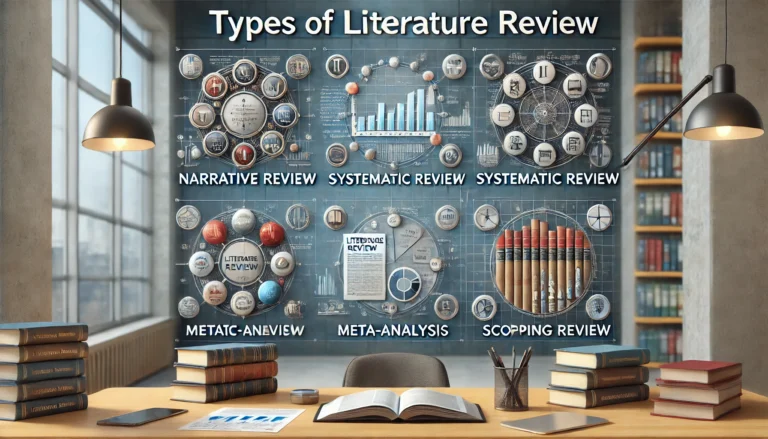Literature Review
Literature review is an evaluation of past studies. It is based on secondary data. A literature review means writing down an overview of each relevant study in a critical and logical manner that the researcher has consulted. A mere description of each consulted study is not enough.
Hidden facts are revealed through relevant literature reviews, and the researcher becomes able to identify the aspects of the study, which helps to construct the objectives of the study. These studies can be from books, articles, websites, etc.
Allocating a distinct segment just for the literature review will enable you to carry out a thorough initial investigation and support your research question using reliable sources and studies.
Objectives of Literature Review
The literature review serves several fundamental objectives.
- To acknowledge the researchers whose study has contributed to your own research.
- To assist you in formulating an exact and unambiguous research question.
- To conduct a thorough assessment of existing literature, present relevant material pertaining to your topic.
- To persuade the reader of the significance of your study as a valuable addition to the relevant field.
- To synthesize the information in that literature into a summary.
- It assists in establishing the connections between the subject you are intending to investigate and the existing body of research.
- It conducts a thorough analysis of the material collected by highlighting gaps in the existing knowledge, showing limitations of theories and points of view, formulating areas for further research, and reviewing areas of controversy.
Types of Literature Review

Narrative Review
A narrative review offers a comprehensive summary of a certain subject. A literature study of this type is quite prevalent and provides an extensive overview of the topic. This method is frequently employed in exploratory research to gain an understanding of the current knowledge foundation. Nevertheless, it does not possess the rigorous method seen in other forms of reviews.
Systematic Review
A systematic review utilizes a systematic and rigorous methodology to find, choose, and evaluate relevant research on a certain subject. The objective is to offer a thorough and impartial overview of the results. This type of evaluation is frequently employed to disseminate evidence-based methodologies and is characterized by its clarity and replicability.
Meta-Analysis
A meta-analysis surpasses a systematic review by statistically amalgamating the findings of various studies on a certain subject. By employing a quantitative method, researchers are able to make more accurate inferences about the overall impact of a certain intervention or phenomena compared to what can be accomplished through individual investigations.
Meta-analysis is frequently employed to offer an excellent degree of evidence for therapeutic treatment.
Scoping Review
A scoping review comprehensively examines the range and extent of existing research on a specific subject. The objective is to ascertain fundamental principles, gaps in literature, and the research methodologies employed in the discipline.
Scoping reviews tend to provide information for further studies or the formulation of policies. They offer a primary overview of a subject prior to a comprehensive systematic evaluation.
Why do we Write Literature Reviews?
Literature reviews offer a convenient and informative overview of a certain subject. If you are short on time for conducting research, literature reviews might provide you with a comprehensive summary or serve as a starting point.
For professionals, they are valuable tools that provide them with advance information on the latest developments in their respective fields.
The extensive and comprehensive literature review enhances the author’s reputation among researchers in their respective field. An in-depth understanding of the literature pertaining to the area is crucial for most research activities.
Functions of Literature Review
In relation to your own study, the literature review can help in four ways. It can:
- Enhance the clarity and concentration of your research problem
- Enhance the effectiveness of your research methodology
- Expand your knowledge base in your study area
- Contextualize your findings.

Bringing Clarity and Focus
A contradiction exists in the literature review. Literature searches are ineffective without an issue to explore. However, the literature review can greatly influence your research problem because it helps you understand the subject matter and conceptualize your research problem more clearly and relevantly to your field of inquiry.
When studying the literature, you learn what others have studied in your field, what they found, what gaps they uncovered, and what they advise for additional research. All of these will assist you understand your research topics and give clarity and focus for a valid study. It will also help you focus your research on knowledge gaps, making it more relevant.
Improving Research Methodology
Reading the literature introduces you to methods others have used to address comparable research issues. A literature study shows if others have used comparable strategies that have worked successfully and what issues they have had.
Knowing the problems and risks can help you choose a research approach that can answer your topic. This will boost your confidence in your methodology and help you to defend it.
Broadening Your Knowledge
The main purpose of the literature review is to ensure you read your research topic thoroughly. You should know what other researchers have found, what ideas have been proposed, and what knowledge gaps exist.
Research projects for higher degrees (e.g., M.Phil or PhD) require expertise in your field of research. You may meet this expectation with a thorough literature study. A literature review also helps you understand how your study’s findings fit into current knowledge.
Enable to Contextualize Your Findings
Answering your research questions is easy; integrating your results into the body of knowledge is complex. How do your study findings compare to others? What have you added to the existing knowledge? How do your results vary from others?
Writing a literature review lets you compare your findings to others and address these questions. Your findings should be contextualized within your field of study.
How to Write a Literature Review?
The literature review is important. Acquiring the skill of writing a literature review will enable you to create an appealing and remarkable literature review. Enhance the organization of your literature review by including subheadings to provide a coherent and continuous flow of information.

Strive to avoid causing boring for your readers, teacher, or committee. Compose it in an engaging way. A literature review serves two main functions.
- To provide a theoretical background to your study
- To facilitate the integration of your findings within the current knowledge base and improve your research process.
Your literature review must include these two tasks.
Provide Theoretical Background
In order to fulfill the first purpose, you have to perform the following tasks;
- Analyze and illustrate many theories pertinent to your field of study.
- Clearly outline gaps in the current knowledge of the subject matter.
- Present recent breakthroughs and advancements in the area of research.
- Present trends and comparable phenomena.
While reading the theoretical background material for your subject, some themes will emerge. List the key ones as subheadings. Some people write the entire literature review in one section, entitled ‘Review of the literature,’ ‘Summary of literature,’ or ‘The literature review,’ without subheadings, but the author strongly recommends subheadings based on the main themes you found and which form the basis of your theoretical framework.
These subheadings should be clear, illustrate the idea, and flow logically. Now, under each subsection, provide the primary findings about the subject, including arguments for and against and gaps and concerns.
Contextualize Your Findings
To fulfill the second objective, it is necessary to include the outcomes of your research by comparing them with relevant specific findings from the current body of literature. This comparison will determine if the findings match or contradict.
It is important to understand that, at this point, you can only achieve the initial purpose of the literature review, which is to offer a theoretical foundation for your investigation. For the second function, properly contextualizing the findings, it is necessary to wait until you reach the stage of producing the research report.
Finally, your writing about the literature reviewed should be thematic in nature that is based on main themes; the sequence of these themes in the write-up should follow a logical progression; various arguments should be substantiated with specific quotations and citations from the literature and should adhere to an acceptable academic referencing style.






